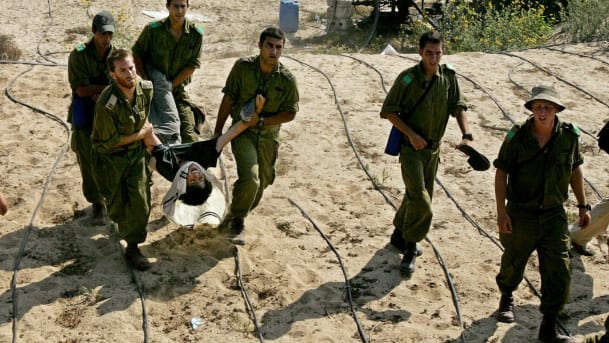
As humans, one of the hardest things to do is give up something we love. When something is held so close to the heart, our strongest instinct tells us to guard it with all of our might.
The State of Israel may be relatively young, but Zionism is not nearly as new. The yearning to live in our ancestral homeland has existed for thousands of years. We’ve known, since the beginning of time, that this land was something we had to protect for eternity.
Strides Towards Peace
Today, despite our love for Israel, we understand that others will stop at nothing to cause it harm. This is why, on Israel’s end, there have been countless attempts to ease tensions with the Palestinians through land partitions and peace offers, all of which were rejected by the Palestinian leadership.
In 2005, in an attempt at making peace with the Palestinians, Israel unilaterally withdrew from Gaza. This decision divided the country; many believed that this was a huge mistake, while others argued that it was worth the risk.
Gush Katif was a Jewish neighborhood established in the Gaza Strip in 1970. Unfortunately, the situation there intensified during the year 2000, when the Second Intifada broke out. During this time, attacks on Israelis escalated dramatically.
Five years later, residents were notified that Israel would be withdrawing from Gaza in order to achieve peace, and to empower the Palestinian people. If this plan proved to be successful, it would have served as confirmation that the Palestinians were ready for their own state.
As part of the disengagement, the Israeli Army forcibly removed around 8,000 Jewish residents from Gush Katif, displacing hundreds of families. All of the private property within the settlement was completely destroyed, the settlement was dismantled, and the entire Gaza Strip was handed over to the Palestinians.
This put Israeli soldiers, who swore to protect our people, in an extremely difficult place. They were ordered to pull Israeli citizens — Jews — out of their homes by any means necessary. If, as a nation, we call each other family, then this resembled siblings dragging siblings away. Undoubtedly, stripping Israel of a crucial piece of its land is painful in every aspect, but the hopes for peace were firm at the time.

This was not the first time that Israel had shown its willingness to disengage or negotiate in the name of peace. Following the Israel-Egypt peace treaty of 1979, signed by President Anwar Sadat and Prime Minister Menachem Begin, Israel withdrew from the Sinai Peninsula in 1982. The Sinai is around four times the size of Israel, containing a tremendous amount of oil — both essential assets that Israel was willing to relinquish for peace.
Almost a decade later, in the 1990s, after secret negotiations between the Palestine Liberation Organization (PLO) and Israeli authorities, the Oslo Accords were signed. In order to be one step closer to peace, Israel withdrew from multiple areas in the West Bank. However, only a few years later, this agreement began to deteriorate as a new round of Palestinian terror began.

Additionally, the 2000 Camp David Accords offered a comprehensive plan that would have allowed the Palestinians to establish a demilitarized Palestinian state in 92 percent of the West Bank and all of the Gaza Strip. Yet this proposal was rejected, with no counteroffers, by Yasser Arafat, president of the Palestinian Authority (PA) at the time.
Most recently, the 2008 Olmert proposal would have meant an almost complete Israeli withdrawal from the West Bank and Arab neighborhoods in East Jerusalem, and put the Old City of Jerusalem under international control. This plan would have divided Jerusalem, but was once again turned down without any counter-proposals by PA President Mahmoud Abbas.
As Israel continues to flourish, one of its greatest aspirations is peace. Unfortunately, Israel and the Palestinian leadership still remain at a point of conflict. It is fundamental that the Palestinian Authority consider all proposals from Israel and understand that if these offerings do not suit them, they may suggest other ideas in order to equally cooperate in the peace process.
When someone claims that Israel does not want peace, you must tell them the excruciating story of Gush Katif. Make it clear that the path to peace is a two-way street, and, at the end of the road, lies a world in which life is better for both peoples. Let us come together as a society, as one human nation, and create harmony in a land where individuals from all walks of life are welcome.
Originally published in The Algemeiner.
Contributed by 2018-2019 John Jay College of Criminal Justice CAMERA Fellow Sarah Saide.
